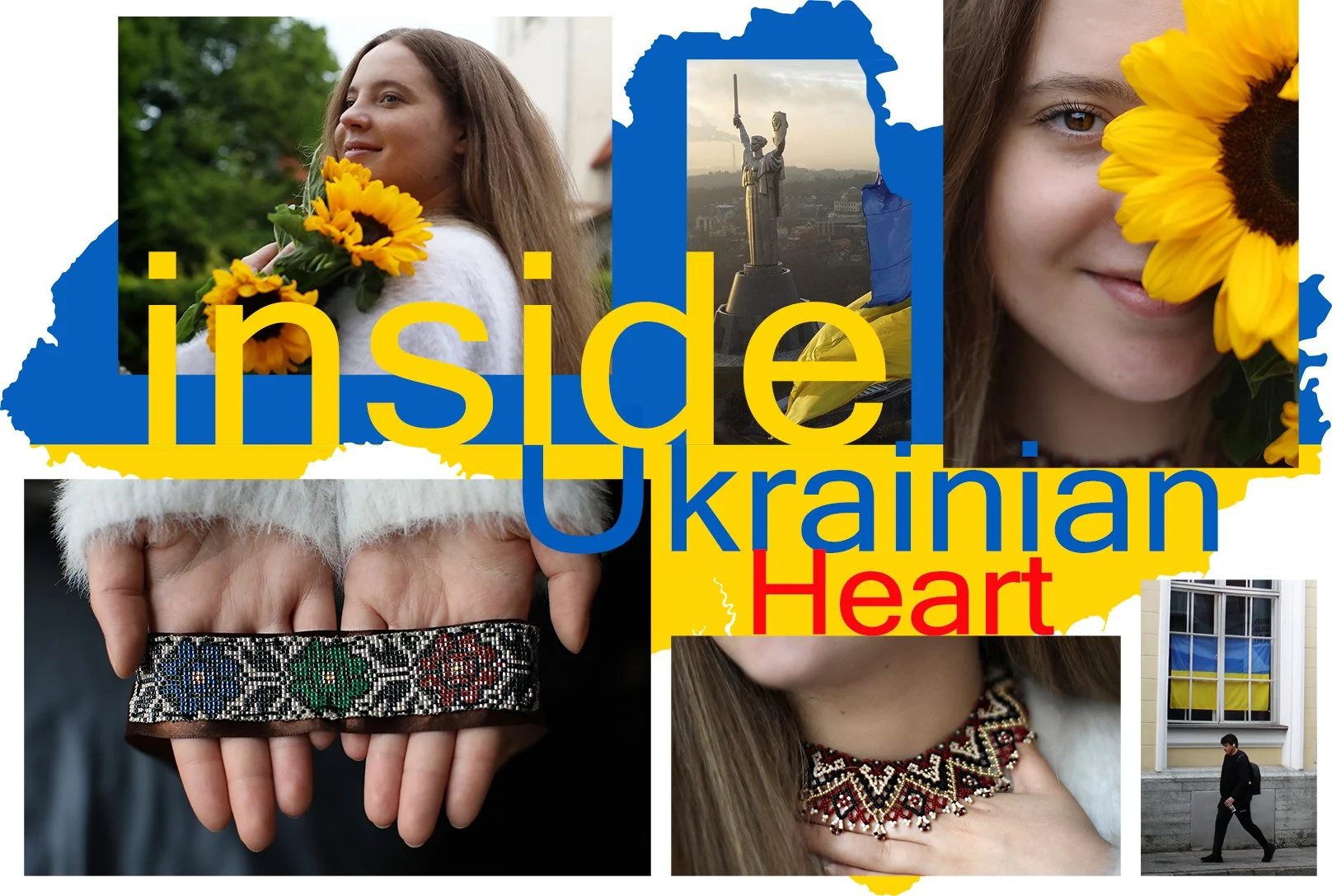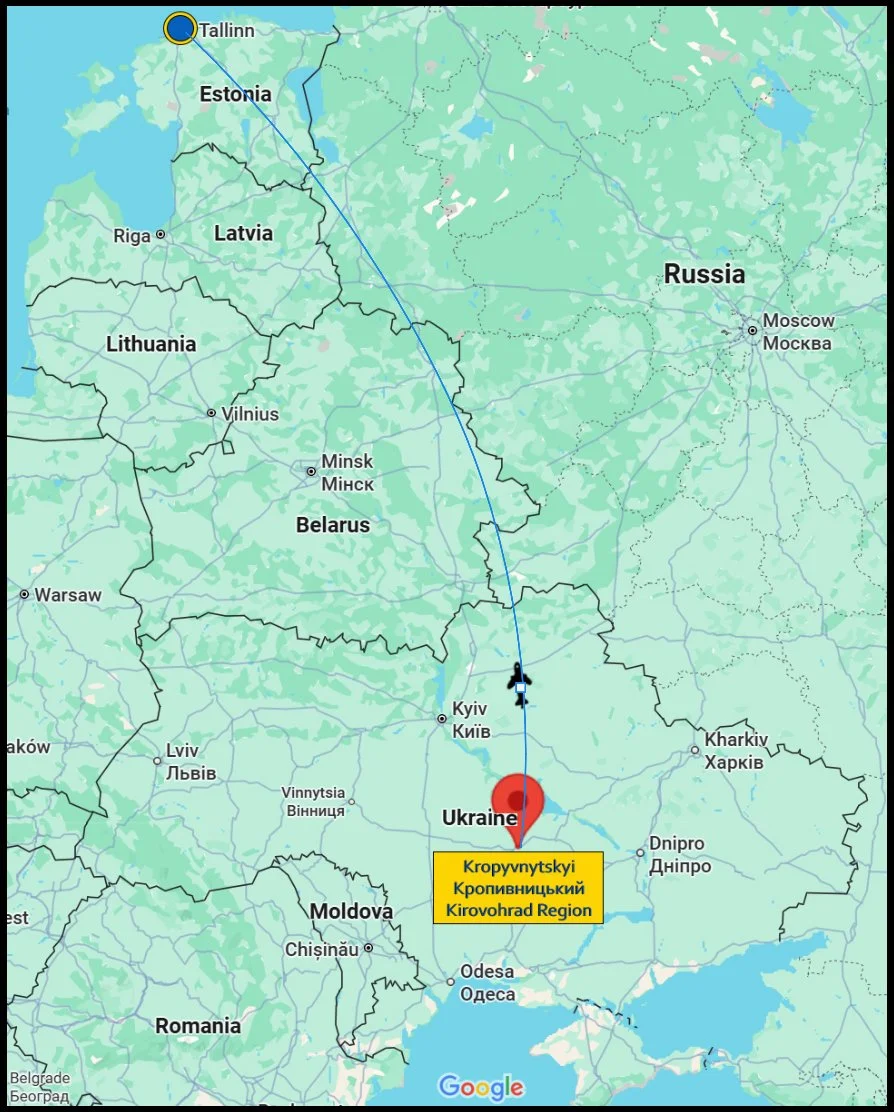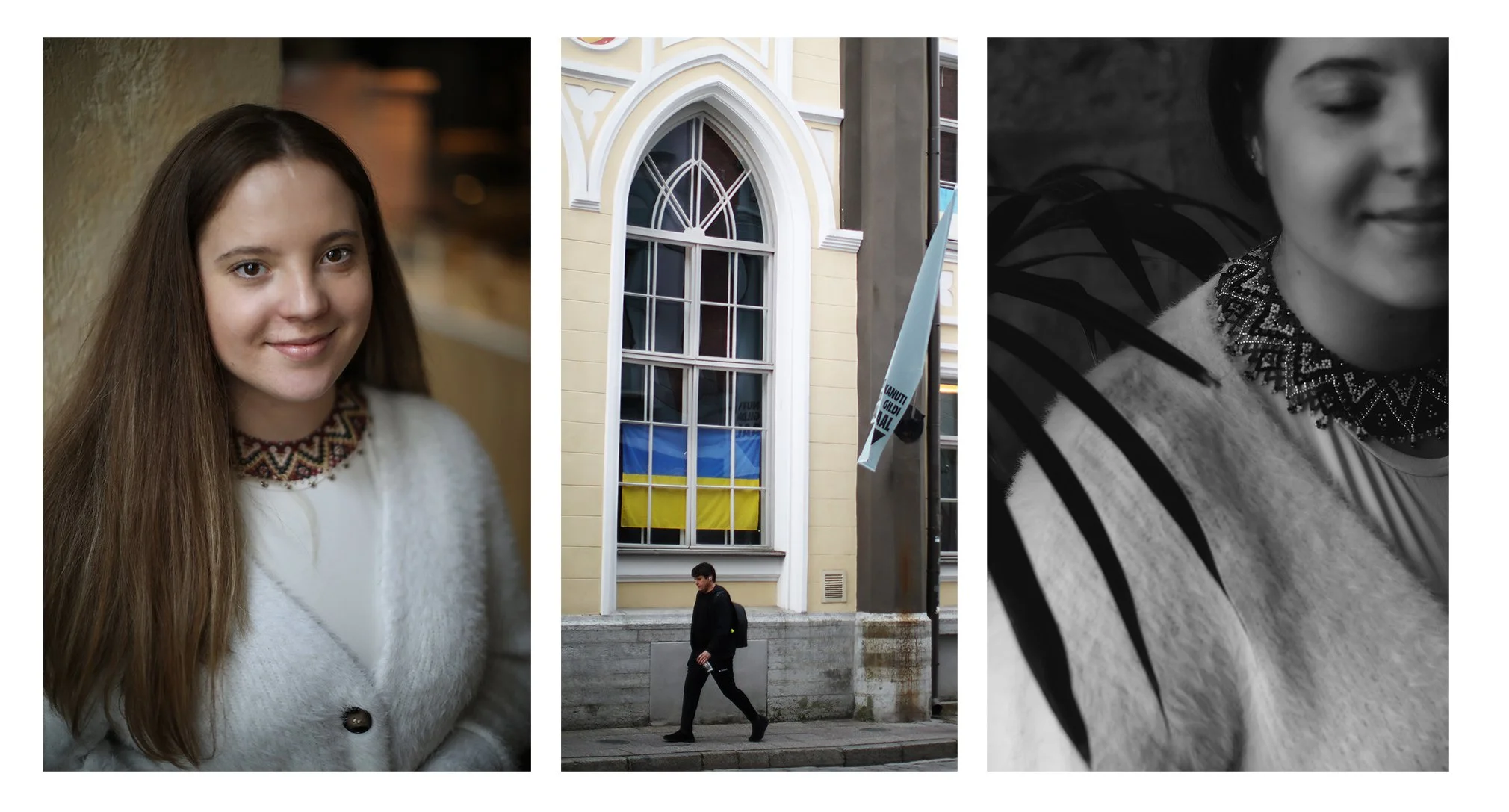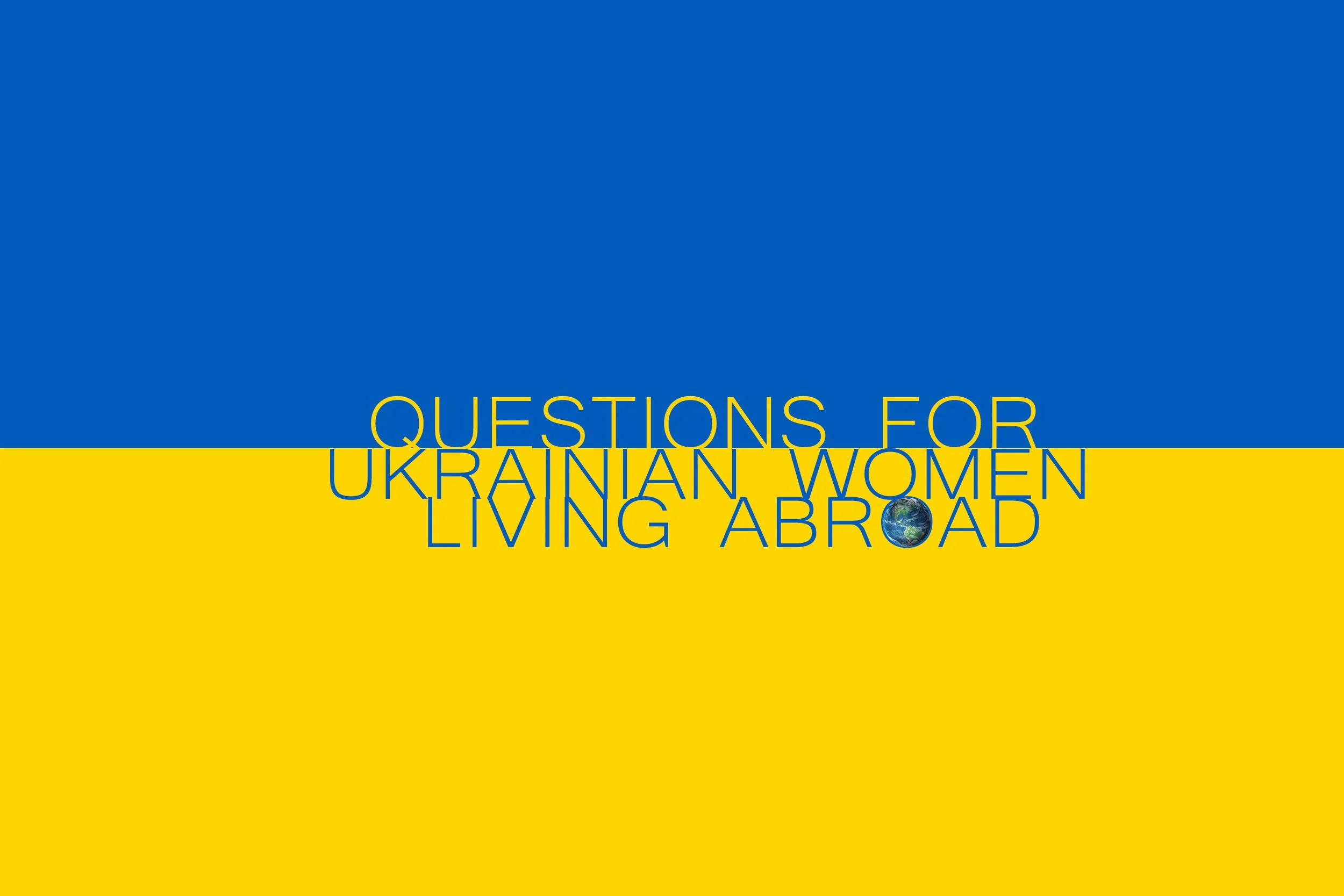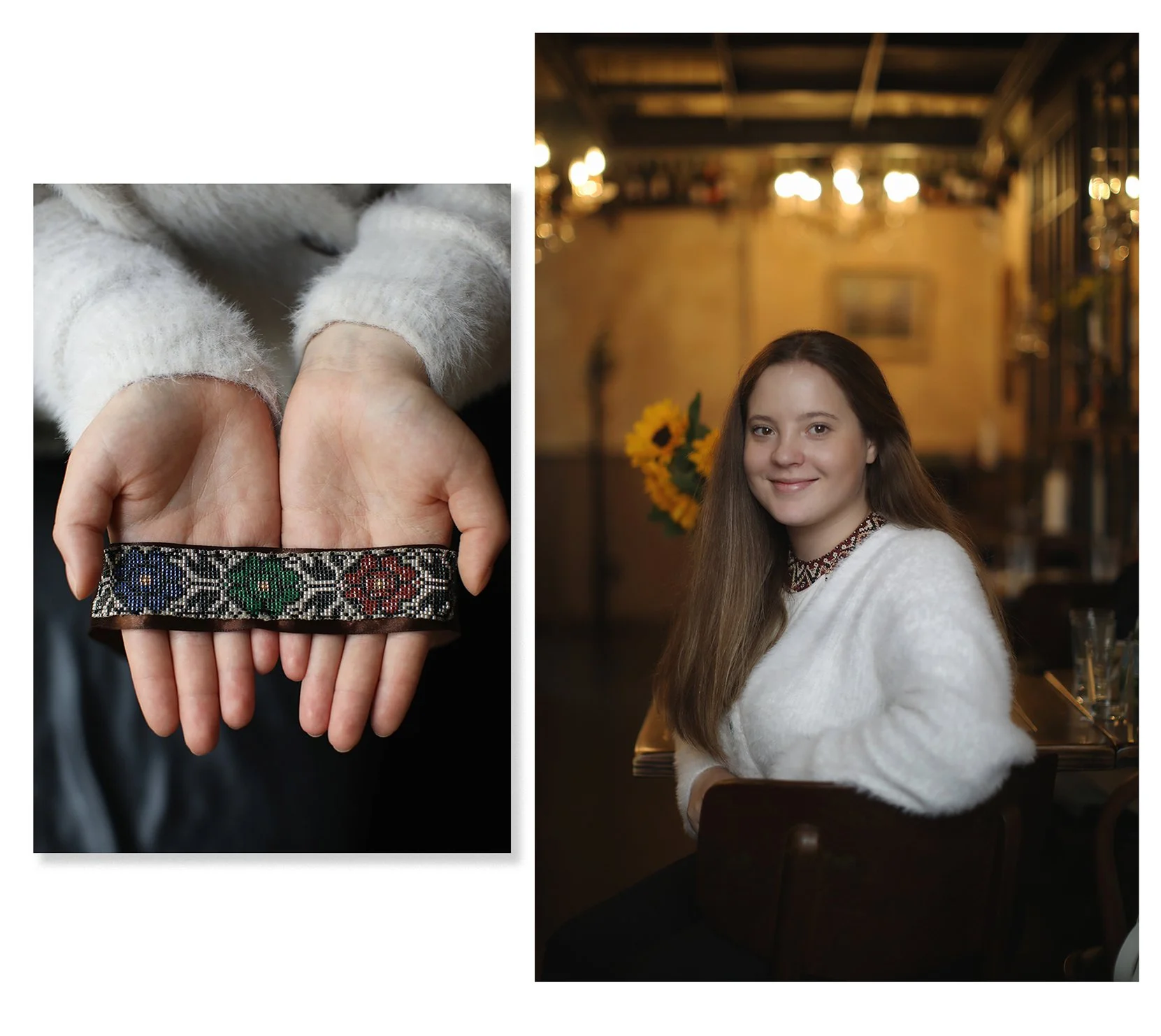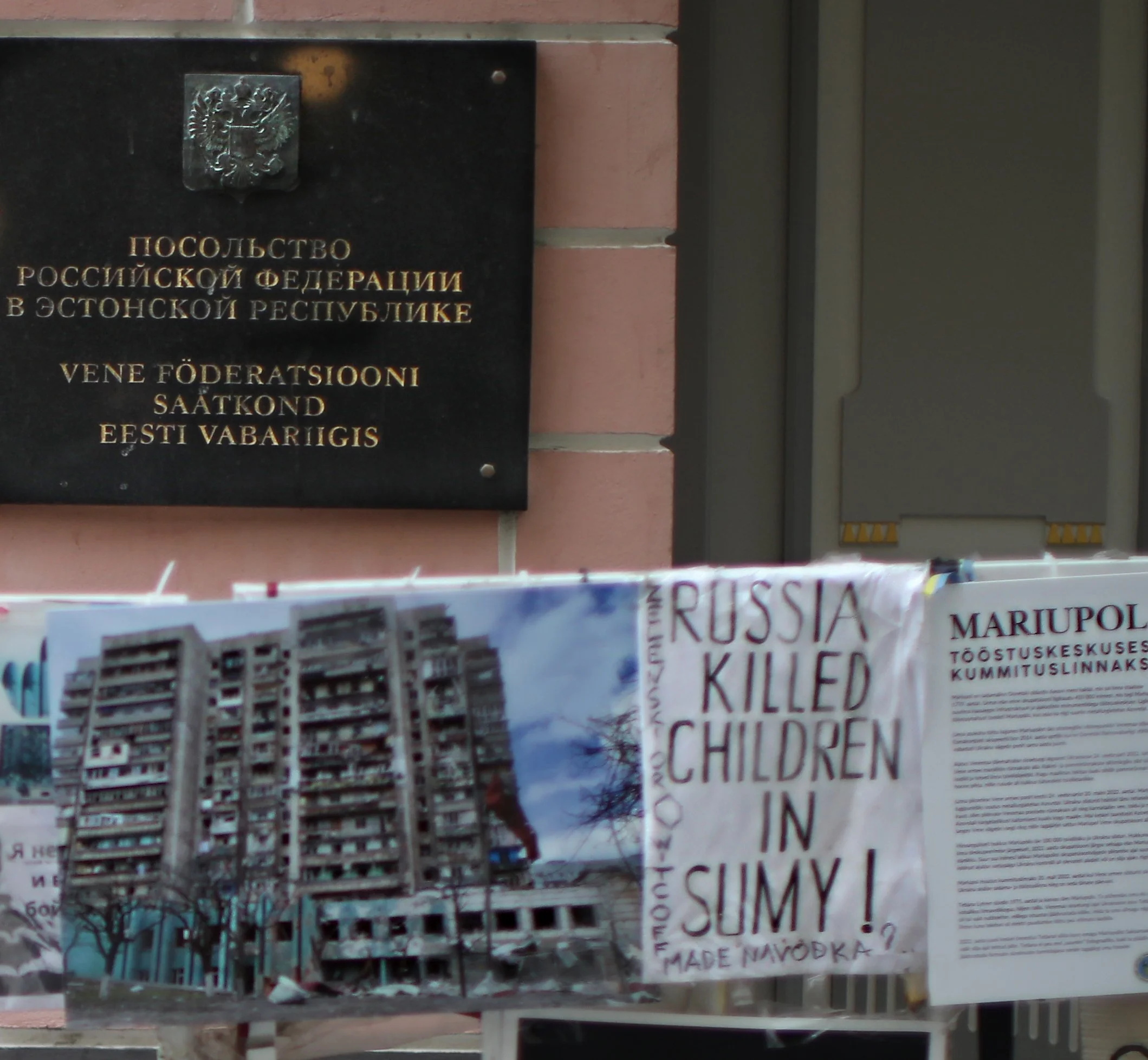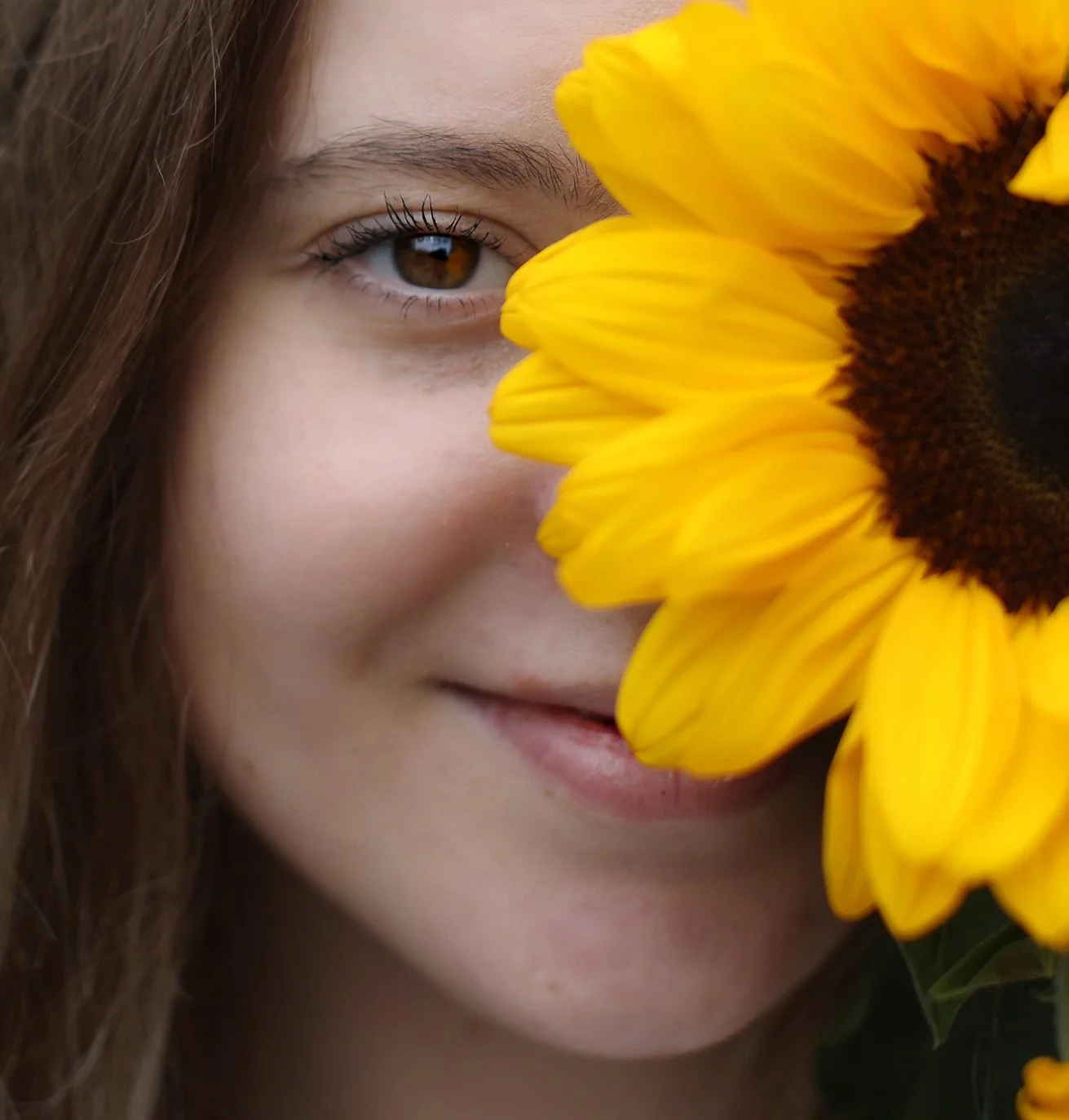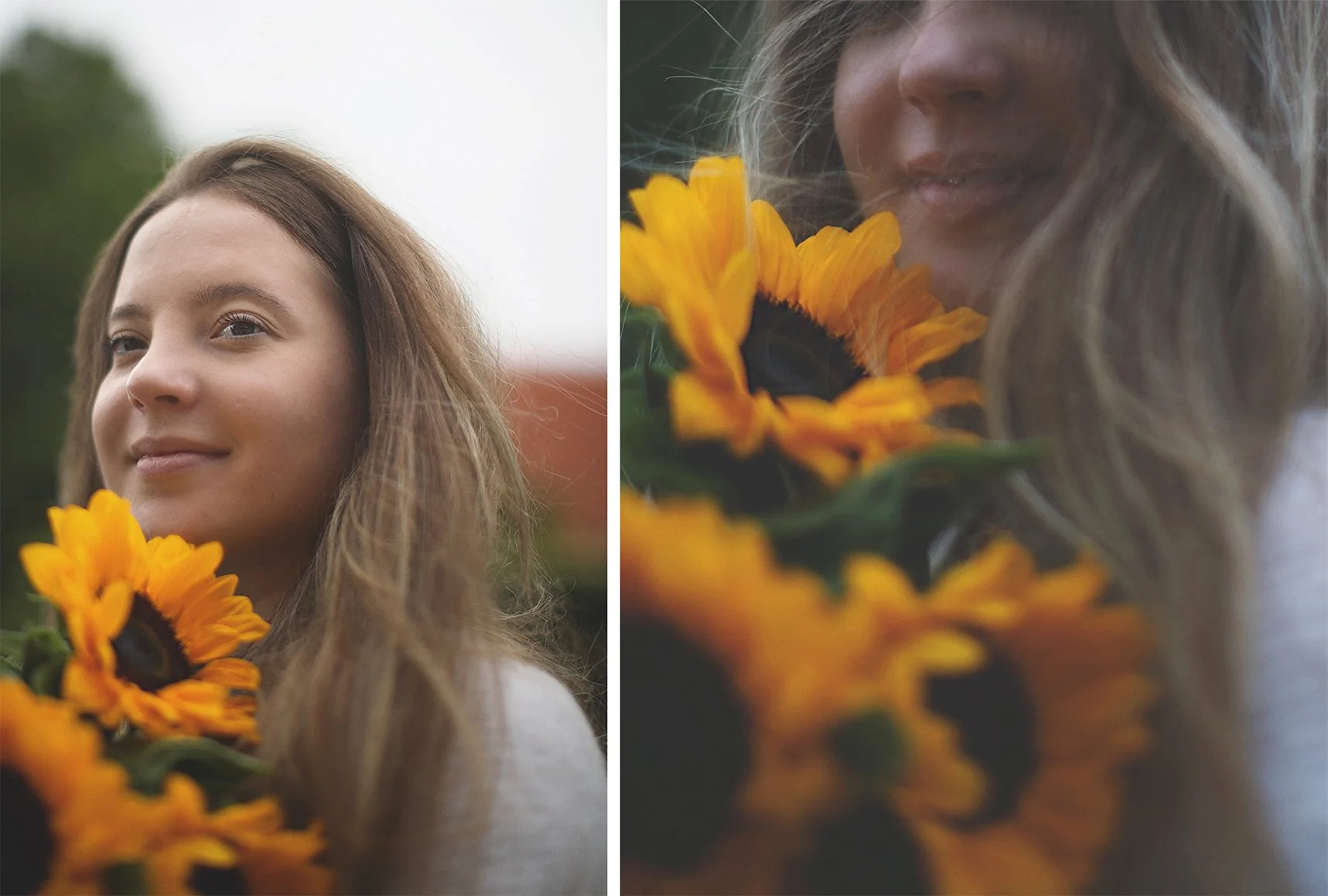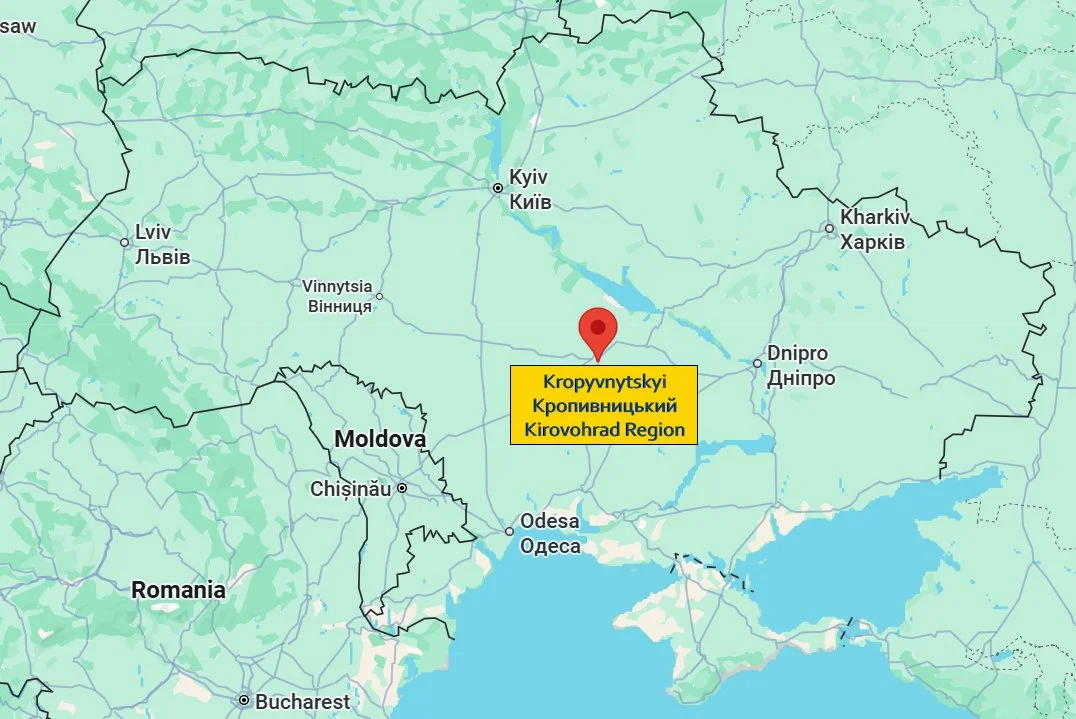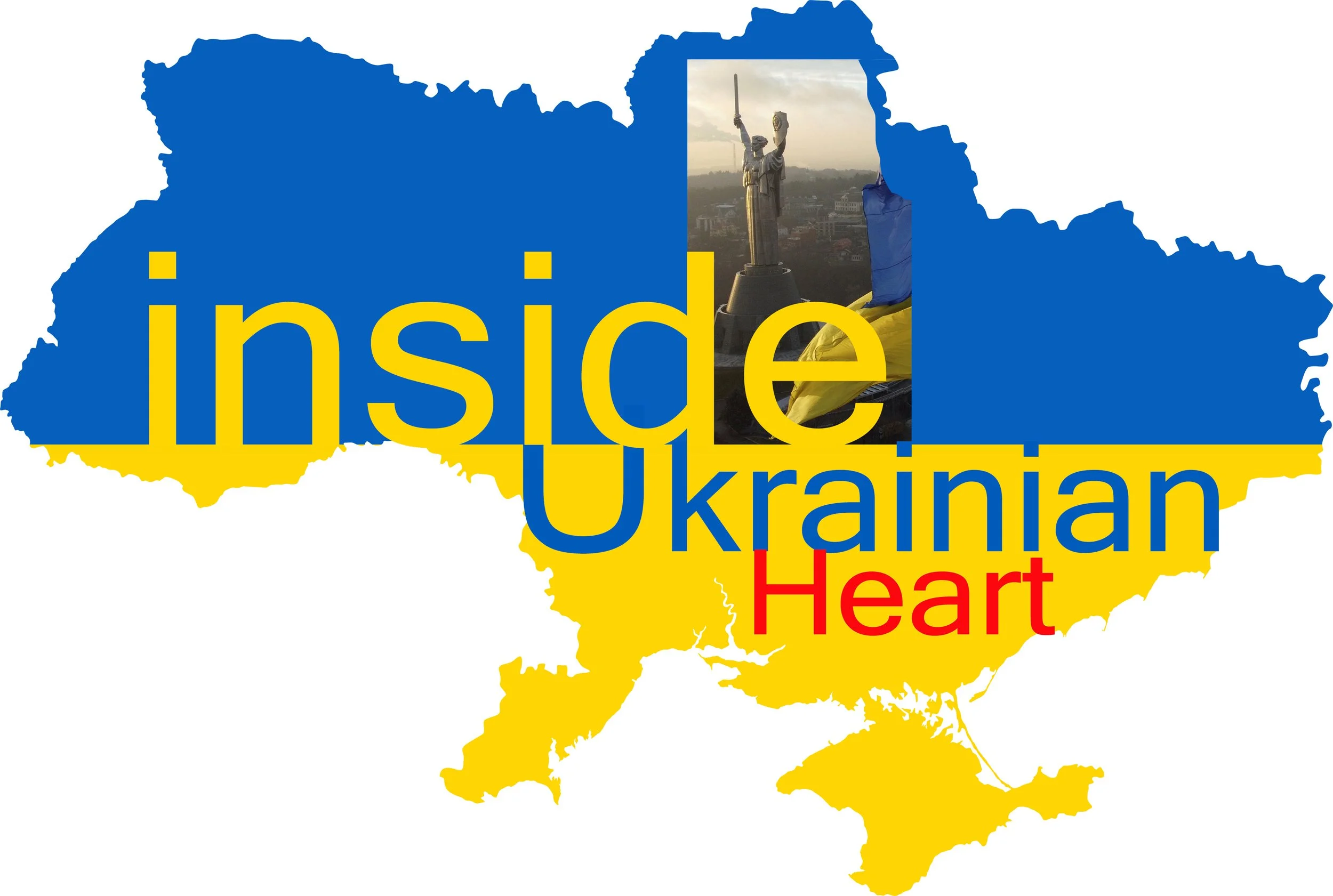THIS INSIDE UKRAINian Heart STORY IS FROM Tallinn, Estonia
* All images were taken by Olga Shmaidenko.
This interview took place in Tallinn, Estonia, where my Inside Ukrainian Heart WOW Woman, Olha Makarchenko, opens up about the day the full-scale russian invasion began and how everything changed. Separated from her family for years, Olha speaks not only about loss and fear but also about love, duty, and the strength it takes to keep moving forward as a Ukrainian living abroad.
Olha’s story reflects the experience of millions of Ukrainians whose lives were divided into “before” and “after” February 24, 2022. War affects everyone differently, but meeting Olha was deeply moving for me. I sat across from a young woman whose entire life trajectory had been violently altered by the actions of a murderous nation. Witnessing her confusion, sadness, and uncertainty about the future was profoundly painful, especially knowing that her story mirrors those of millions of other Ukrainians.
And yet, speaking with Olha also thawed my heart. I saw a young woman searching for her path, navigating the challenges of forced immigration, and finding her own way of representing Ukrainian culture and identity abroad. She constantly seeks ways to share knowledge about Ukraine, whether by creating and selling traditional crafts or speaking about Ukraine’s history on a local radio station. Even in the smallest gestures, Olha protects her heritage, such as keeping her social media strictly in Ukrainian, despite living in a country where roughly 20% of the population is ethnically russian.
Spending time with Olha left me both furious and hopeful. Furious at the terror russia inflicts on a single life, multiplied by millions. Hopeful because of the resilience, dignity, and determination I saw in Olha - a reflection of Ukraine’s future.
- Olga Shmaidenko, Founder of WOW Woman
Photographer, Ukrainian Voice Abroad, Tallinn, Estonia
1. Name.
Olha Makarchenko
2. Where is your hometown?
Kropyvnytskyi. But I was born in the town of Novhorodka in the Kirovohrad district, which has since been renamed Kamiianetske.
3. Your profession / career / self-identification. What does a typical day look like for you? What did you study?
I studied engineering at the Kirovohrad National Technical University, but life took me in a completely different direction. I became a photographer in Tallinn.
My days are unpredictable. Sometimes they are filled with incredible adventures, and other times they are quiet, ordinary, even a little gray. And then there are moments of magic, like the ones that happen in my kitchen, because I absolutely love to cook.
Lately, I have also been very focused on growing my social media presence.
4. Your journey to where you are today, in life and career. What are some achievements you are proud of? Was there a moment that changed your path?
I turned 26 on May 26, 2025. And honestly, it feels like I am only just beginning to find the path I want to follow.
5. Where in the world do you feel “the highest” - your happiest place?
I have several. One of them is in Lubny. But I did not realize how much it meant to me until I had already lost it. That is where I spent my childhood, where my grandparents lived. I thank God every day for blessing me with someone I love and a family to cherish. So now, my happiest place is wherever they are.
6. Which extracurricular activities or hobbies are you most proud of, and why?
I went to a small village school, where there were not many clubs or activities to choose from. So I often helped our elderly neighbor. I still remember the day she came to our first day of school celebration and proudly praised me in front of everyone. I was glowing. Later, I became a volunteer for the Red Cross and even earned a diploma and an encyclopedia for my work. I still wish I had those things with me.
7. Who do you want to become “when you grow up”? What are your future goals and challenges?
Honestly, I find life so endlessly fascinating that I want to try many different things. I would love to test myself as a chef, write a book, and curate a photo exhibition, one dedicated to Ukrainian culture and the way it weaves into our present.
8. What three qualities do you value most in yourself? What are your superpowers?
If honesty and openness to the world count as superpowers, then those are definitely mine. And maybe also my empathy, for people, for animals, for everything living around us.
9. What advice would you give your 14-year-old self? And what advice would your 14-year-old self give you now?
I would tell her: “Olichka, life is an adventure, not a checklist. Do not be afraid to show up, to speak up, to try new things. And start your social media earlier, do not wait until you are 26.”
And I think my 14-year-old self would remind me not to take everything so seriously. To keep some of that lightness, like when I used to wander into my mom’s room at 11:30 p.m. with unfinished homework and somehow, it was okay.
10. What are you reading right now? What books do you love or give as gifts?
Right now, I am reading a lot of articles about famous Ukrainians because I am preparing a special radio segment about them. But generally, I adore novels, detective stories, and adventures.
The last book I gifted was to my boyfriend, Serhii Plokhy’s The Gates of Europe: A History of Ukraine from the Scythians to Independence.
11. Who is your WOW Woman, someone who inspires you? Who would you nominate, and why?
All the women on the frontlines right now are WOW WOMEN to me, every single one of them. But beyond that, I deeply admire Mariia Bashkirtseva, a Ukrainian and French artist. I once created a whole radio program about her, she is truly a cultural gem. Imagine this: her paintings hang in the Louvre, yet she was born in the Poltava region.
I am also endlessly proud of my mom and my grandmother Liuba. They have taught me to love this world, to cook with care, and to never, ever give up. They are my constant source of strength and inspiration.
12. Where can others find you and your work? (Links to websites, blogs, etc.)
Facebook: Link
Instagram: @olha.makarchenko
1. Where were you during russia’s attack (in 2022, but of course, you can also write about the first occupation of territories, the Maidan, and Crimea)? Did you believe in the possibility of an attack on Ukraine’s key cities and the start of a full-scale invasion? What was your experience on the first day of the war? Where did you go, and what was your plan? How are your family and friends doing now? How often do you stay in touch?
Well… I suppose I should start my story back in 2014 (when russians invaded Eastern Ukraine and took over Crimea). The war came to Ukraine when I was 14, and by May I had just turned 15. That year was unbearably heavy for the entire community where I grew up. I remember my mom sitting in front of the TV until late at night, watching the news, crying silently, praying endlessly. None of us knew what to prepare ourselves for. russia loomed over us like a dark, suffocating cloud.
Then, on July 16, 2014, our community received devastating news. Our fellow villager, the neighbor’s son, Novak Vasyl Vasylovych, a senior lieutenant and deputy commander of a company in the 28th Separate Mechanized Brigade, had been killed.
I still remember his funeral clearly: a long line of people, tears streaming down silent faces, an entire community grieving together. My young heart froze that day. The war was real. My grandmother’s old war stories suddenly came alive. Ukraine, a country where World War II veterans still walked among us, had become a country of 20-year-old veterans.
I remember the power cuts. I remember that unspoken, unanswered question floating in the air: “What will happen next?”
And the answer came years later, on February 24, 2022, in the sound of explosions.
By then, my boyfriend and I had been living in Estonia for nine months. I remember that morning vividly. I was sick with COVID, sleeping, when suddenly, at six in the morning, my mom called:
"Olya… the war has started."
I felt the blood drain from my veins. My whole body went cold. I don’t remember what happened for the rest of that day, only the feeling that something inside me had died. We were supposed to go home in May.
Then came sleepless nights, endless scrolling through news feeds, constant Telegram alerts, frantic calls to my parents:
— Where are you?
— What’s happening there now?
I cried every single day. Cried reading the news. Cried watching the President’s addresses. Cried, constantly.
In April, my mom came to me in Estonia, and breathing became a little easier. But back home remained my brother and his family, my dad, my grandparents, my boyfriend’s relatives, my friends, my entire life. I keep in touch with all of them. And every time I’m reminded that Ukrainians cannot be broken.
Because when I hear, during a phone call, that my loved ones have started joking again, I know that we will live.
2. What specific actions, big or small, have you taken and continue to take to help Ukraine and Ukrainians?
I believe there is always more we can do. At the start of the full-scale invasion, I helped Ukrainians with their paperwork and documents. I also tried to donate whenever I could, to the Serhiy Prytula Foundation and to random fundraising campaigns I came across on Instagram. These were not large amounts, but I always made an effort to contribute something.
Later, photography came into my life. I met Inna Hordiienko from the Association of Ukrainians in Estonia and began taking part in fairs organized by Ukrainian craftswomen, photographing their events and helping showcase their work. Eventually, I was invited to host a segment on “Druzi,” the first Ukrainian-language radio station in Estonia. There, I had the chance to tell stories about prominent Ukrainian figures. I am very proud of this project because I believe the Ukrainian people have so many incredible sources of inspiration. We have countless brilliant minds and talents the entire world deserves to know about.
3. Do you feel the war has changed you? How so? Have you discovered anything surprising about yourself, your country, or humanity since the war began? What insights have you gained?
The war has changed me. I grew up. My perception of the world shifted, and I realized that the most precious things in life cannot be bought with money. A peaceful sky is a privilege. Waking up to the sound of an alarm clock rather than explosions is a gift to be treasured. Memories are treasures we must guard closely, and every phone call, every conversation with loved ones, is a gift from today.
I have been deeply inspired by Ukrainians who stood unarmed before tanks to defend their homes. I have also grown even more curious about Ukrainian culture and traditions. I found a small island of peace for myself by creating traditional beadwork, crafting herdans and syliankas with Ukrainian patterns — a quiet way to stay connected to my heritage.
4. In your opinion, how are Ukrainians different from Russians? Do you want justice for Ukrainians? Do you believe it is possible, and what would you like to see?
That is a good question: how are we, Ukrainians, different from Russians? The answer, for me, is simple — our love of freedom. We do not invade other countries, we travel to them. We do not demean other cultures, we are inspired by them. We do not destroy languages, we learn them.
(pictured are protest posters hung outside the russian embassy in Tallinn, Estonia)
5. What do you want the world to know, realize, understand, or appreciate about Ukrainians and Ukrainian women in particular?
Yes, of course, I want justice for Ukrainians!
I believe that every Ukrainian has the right to life, and that, above all else, is true justice.
I dream of Ukraine becoming a part of the European Union and I want the world to discover the charm of Odesa, the grandeur of Kyiv, and the rich traditions of our regions. I want people to taste Poltava dumplings and Hutsul banosh, to walk the streets of Lviv and Kharkiv, and to see the beauty of our culture firsthand.
And I want no one, ever again, to confuse Ukrainians with russians. I want it to become unthinkable to even search for similarities between us.
One could talk about the Ukrainian woman forever!
She is strong and independent.
She can be among the best in the world in beauty and fashion, yet she does not hesitate to put on a bulletproof vest and go into battle.
She is intelligent, accomplished, and deeply knowledgeable, an incredible mother and a loving wife.
She is capable of anything when her family or her country needs her.
To me, the Ukrainian woman is a symbol of extraordinary resilience and the fight for peace in the world.
6. What is it like living outside Ukraine now while staying connected with your family and loved ones back home? Can you describe it for those who find it hard to imagine?
Life abroad cannot be compared to what every Ukrainian living at home experiences during the war. But I know this: I am a thread of calm for my family. If something terrible happens, they know they can rely on me. They know that somewhere in the world, there is a soul who loves them deeply, who is always close even if not physically present.
7. How do you see the shifts in attitudes within Ukraine between those who stayed and those who left? Do you believe Ukrainians abroad have a special responsibility toward their homeland?
I want Ukrainians to know that those of us abroad are doing everything possible to make sure Ukraine is heard. Everyone, even without realizing it, is fighting against russian propaganda and lies about “khokhols.” I am proud of Ukrainians in Estonia. They are incredible. They are learning the language, integrating into society, starting businesses, and supporting one another.
For example, my friend Ruslana is already working toward a B2 language level — and that is no small thing. Many people who have lived here their entire lives never reach that level. I am proud of those who open their own shops, who run blogs in Ukrainian, even when they face hatred from the russian-speaking community in Estonia. That too is resistance. Yes, it cannot compare to the resistance of our soldiers, but we are doing everything we can.
Every Ukrainian who has access to the internet carries a responsibility to speak about Ukraine on social media, at least from time to time. We cannot let the world forget that we exist, that we are under fire, and that we need support. Every day, we are being killed, and every day, we hold on. We all share one single mindset: to win, to defeat the enemy, to survive.
8. What will be the first thing you do when Ukraine wins? What are your dreams for yourself and your family after the war ends?
I will cry for a long time. My dream is that Ukrainians, including myself, never forget this war. History shows us that after a few generations, memories fade and history is rewritten. But I want the love for Ukraine to live on in my family forever.
I want embroidered shirts and herdans to become family heirlooms. I want my children always to know who they are, that they are Ukrainians, descendants of a great nation. And I want them to understand that many sons and daughters, whose blood runs in their veins, gave their lives for their peaceful sky.
Це інтерв'ю «Усередині українського серця» відбулося в Таллінні, Естонія
* Всі фотографії взяті Ольгою Шмайденко.
Це інтерв'ю відбулося в Таллінні, Естонія, де моя WOW-Жінка Inside Ukrainian Heart, Ольга Макарченко, розповідає про день початку повномасштабного російського вторгнення і про те, як все змінилося. Роками розлучена зі своєю сім'єю, Ольга говорить не лише про втрати та страх, а й про любов, обов'язок та силу, необхідну для того, щоб продовжувати рухатися вперед як українка, яка живе за кордоном.
Історія Ольги відображає досвід мільйонів українців, чиє життя розділилося на «до» і «після» 24 лютого 2022 року. Війна впливає на кожного по-різному, але зустріч з Ольгою була для мене глибоко зворушливою. Я сиділа навпроти молодої жінки, чия життєва траєкторія була жорстоко змінена діями країни-вбивці. Спостерігати за її розгубленістю, сумом і невпевненістю в майбутньому було глибоко боляче, особливо усвідомлюючи, що її історія віддзеркалює історії мільйонів інших українців.
І все ж, розмова з Ольгою також відтанула моє серце. Я побачила молоду жінку, яка шукає свій шлях, долає виклики вимушеної імміграції та знаходить власний спосіб репрезентувати українську культуру та ідентичність за кордоном. Вона постійно шукає способи поділитися знаннями про Україну, чи то створюючи та продаючи традиційні ремесла, чи розповідаючи про історію України на місцевій радіостанції. Навіть у найменших жестах Ольга захищає свою ідентичність, наприклад, веде свої соціальні мережі виключно українською мовою, незважаючи на те, що живе в країні, де близько 20% населення є етнічними росіянами.
Час, проведений з Ольгою, викликав у мене одночасно і лють, і надію. Лють від терору, який росія завдає одному життю, помноженому на мільйони. Надію - через стійкість, гідність і рішучість, які я побачила в Ользі - віддзеркалення майбутнього України.
- Ольга Шмайденко, засновниця WOW Woman
Фотограф, Український голос за кордоном, Таллінн, Естонія
1. Ім’я
Ольга Макарченко.
2. Де ваше рідне місто?
Кропивницький (але родилася в смт Новгородка , Кіровоградського району , зараз це село перейменували на Камʼянецьке)
3. Яка ваша професія/кар’єра/посада/самовизначення? Як виглядає ваш типовий день? Що ви вивчали в школі/університеті?
Навчалася я на інженера в Кіровоградському національному технічному університеті,але стала фотографом у Таллінні. Мої дні бувають сповнені неймовірних пригод, а іноді - сірих буднів. Іноді - магії, яка трапляється на моїй кухні,бо я обожнюю готувати.Останні кілька місяців я активно веду свої соціальні мережі.
4. Яким був ваш шлях до того, де ви зараз (у житті та кар’єрі)? Напишіть про деякі досягнення, якими ви найбільше пишаєтеся. Який момент у вашому житті (особистому чи професійному) змінив вас і направив на нинішній життєвий шлях?
Мені 26 років виповнилося 26 травня.І здається я тільки тільки знаходжу шлях яких хочу пройти.
5. Де у світі ви почуваєтеся «найвищою» (тобто де ваше щасливе місце)?
У мене є кілька найщасливіших місць.Одне з них - у Лубнах. Але я зрозуміла це не одразу, а лише тоді, коли вже його втратила.Там пройшло моє дитинство, там жили мої бабуся й дідусь Та я дякую Богу, що Він подарував мені кохану людину і мою сімʼю, яку береже.Тож моє найщасливіше місце - там, де вони.
6. Якими позашкільними активностями/хобі ви найбільше пишаєтеся? Чому?
О, я вчилася в сільській школі. Вибору гуртків та позашкільних занять було дуже мало. Тому я любила допомагати сусідській бабусі.Одного разу вона прийшла на перший дзвоник у нашу школу і на лінійці мене дуже хвалила.Потім я стала волонтером Червоного Хреста, навіть отримала диплом і енциклопедію :)
Шкода, що все це залишилось вдома.
7. Ким ви хочете стати, коли "виростете"? Які ваші майбутні цілі/виклики?
Чесно, мені так цікаво жити це життя, що хочеться спробувати багато всього.Хочу і себе в ролі кухаря випробувати, і книгу написати, і фотовиставку зробити - присвячену українській культурі і тому, як вона вплітається в сьогодення.
8. Які (принаймні три) якості ви найбільше любите в собі і чому? Які ваші суперсили?
Суперсили?Якщо щирість та відкритість до світу вважаються за суперсилу - тоді точно вони, і можливо ще емпатія до людей та всього живого у цьому світі.
9. Яку пораду ви дали б собі в 14 років? Яку пораду ваш 14-річний «я» дав би вам зараз?
Олічка, життя - це маленька гра та пригода. Живи, не бійся проявлятися і почни вести соцмережі не в 26 років. Не треба ставитися до всього так серйозно, згадай, як ти о 23:30 приходила до мами з домашнім завданням.
10. Що ви зараз читаєте? (Які книги ви найчастіше даруєте і які ваші улюблені?)
Зараз я читаю багато статей про відомих українців, бо пишу про них рубрику на радіо.
Але я обожнюю романи, детективи та пригоди! Останню книгу я подарувала своєму хлопцю — Сергій Плохій «Брама Європи. Історія України від скіфських воєн до незалежності».
11. Хто у вашому житті є WOW WOMAN, яка вас надихає, і чому? Чи можете ви номінувати трьох (або більше) жінок, які, на вашу думку, ідеально відповідають опису WOW WOMAN? Що б ви їм сказали, якби мали нагоду, про те, чому ними захоплюєтеся?
Всі жінки, які зараз на фронті, для мене - WOW WOMAN!
Але ще...
Я пишаюся Марією Башкирцевою (українська і французька художниця). Я писала про неї програму — це справжня перлинка нашої культури. Уявіть, її картини прикрашають Лувр, а народилася вона в Полтавській губернії.
Пишаюся своєю мамою та бабусею Любою, бо вони для мене приклад сили та натхнення. Вони навчили мене любити цей світ, готувати та ніколи не здаватися.
12. Де інші можуть знайти вас/ваші роботи (посилання на сайти, блоги тощо)?
!!ДЛЯ УКРАЇНОК!!
1. Де ви були під час російського нападу (у 2022 році, але, звісно, можете написати і про першу окупацію територій, і про Майдан, і про Крим)? Чи вірили ви в можливість атаки рф на ключові міста України та початку повномасштабної агресії? Яким був ваш досвід у день початку війни? Куди ви поїхали і який у вас був план? Як зараз справи у вашої родини та друзів? Як часто ви підтримуєте зв'язок?
Що ж, розпочну свою історію з 2014 року.
Війна прийшла в Україну, коли мені було 14 років, а в травні виповнилося 15.
Це був дуже важкий рік для всієї громади, в якій я зростала. Пам’ятаю, як моя мама до пізньої ночі сиділа перед телевізором, дивилась новини, багато плакала і молилась. Ми не знали, до чого себе готувати. Росія нависла над нами темною хмарою.
А 16 липня 2014 року наша громада отримала трагічну звістку — загинув наш односельчанин, сусідський хлопець, Новак Василь Васильович — старший лейтенант, заступник командира роти з озброєння 28 ОМБр.
Його похорон пам’ятаю досі — довга шеренга людей, сльози, мовчання. Вся громада плакала.
Мою дитячу душу пронизав холод — війна почалась насправді. Воєнні розповіді бабусі ожили.
Україна, де ще жили ветерани Другої світової, стала країною 20-річних ветеранів.
Пам’ятаю, як у нас відключали світло. Пам’ятаю мовчазне, неозвучене питання, яке вітало в повітрі: «Що буде далі?»
А відповідь пролунала 24 лютого 2022 року — вибухом.
На той момент ми з хлопцем вже 9 місяців жили в Естонії.
Я дуже добре пам’ятаю той ранок.
Я хворіла на ковід, спала… І раптом о 6 ранку мені подзвонила мама й сказала:
«Олю, почалася війна».
У мене в жилах застигла кров. Я не пам’ятаю, що було далі того дня — лише відчуття, ніби я вмерла зсередини.
Ми ж мали їхати додому в травні...
Почались безсонні ночі, нескінченні стрічки новин, тривоги в Telegram, постійні дзвінки батькам:
— Де ви?
— Що зараз у вас?
Я плакала щодня. Плакала, читаючи новини. Плакала, дивлячись звернення Президента.
Плакала — завжди.
У квітні мама приїхала до мене в Естонію. Дихати стало трохи легше. Але вдома залишались:
мій брат і його родина, тато, бабуся з дідусем, рідні мого хлопця, друзі — все моє життя.
Я підтримую зв’язок з усіма. І щоразу переконуюсь: українців не зламати.
Бо коли я чую у телефонній розмові, як рідні знову почали жартувати — я знаю: ми будемо жити.
2. Які конкретні дії (великі чи малі) ви зробили та продовжуєте робити для допомоги Україні та українцям?
Я вважаю, що завжди можна зробити більше. На початку повномасштабної війни я допомагала українцям з оформленням документів. Старалася донатити — у фонд Притули, на рандомні збори в Instagram. Це не були великі суми, але я завжди намагалася щось переказати.
Згодом у моє життя прийшла фотографія. Я познайомилась з Інною Гордієнко з Асоціації українців в Естонії, і почала брати участь у ярмарках українських майстринь. Я фотографувала їхні події.
Потім мені запропонували вести рубрику на першому україномовному радіо «Друзі». Там у мене з’явилася можливість розповідати про видатних діячів України. Я дуже пишаюсь цим проєктом, бо вірю: українському народові є ким надихатися. Ми маємо багато геніальних постатей, про яких має дізнатися весь світ.
3. Чи відчуваєте ви, що війна вас змінила? Як саме? Чи здивували вас з початку війни якісь речі в собі (як ви себе тримали, залишалися сильними, знаходили натхнення в несподіваних місцях тощо), у вашій країні, у ваших уявленнях про людство? Які у вас були прозріння?
Війна змінила мене. Я подорослішала.
Моє уявлення про світ змінилося.
Я зрозуміла, що найцінніше в житті — не купується за гроші.
Мирне небо — це привілей.
Прокинутись під будильник, а не під вибухи — це дар, який треба цінувати.
Спогади — це скарб, який потрібно берегти.
Кожен дзвінок, кожна розмова з близькою людиною — це вже подарунок від сьогоднішнього дня.
Я надихалась українцями, які йшли голіруч під танки, захищаючи свої домівки.
Я ще більше зацікавилась українською культурою.
І знайшла маленький острівець спокою — у створенні герданів та силянок з українськими візерунками.
4. На вашу думку, чим росіяни відрізняються від українців? Чи хочете ви справедливості для українців? Чи вірите ви, що це можливо, і що б ви хотіли побачити?
Гарне запитання: чим ми, українці, відрізняємось від росіян?
Любов'ю до свободи.
Ми не нападаємо на інші держави — ми подорожуємо.
Ми не принижуємо інші культури — ми надихаємось ними.
Ми не знищуємо мови — ми їх вивчаємо.
5. Що ви хочете, щоб світ знав/усвідомив/зрозумів/оцінив про українців та українських жінок зокрема?
Так, звісно, я хочу справедливості для українців.
Я вірю, що кожен українець має право на життя. І саме це — найбільша справедливість.
Я дуже хочу, щоб Україна стала частиною Європейського Союзу.
Щоб світ відкрив для себе шарм Одеси та велич Києва.
Щоб кожен у світі спробував полтавські галушки та гуцульський банош.
Щоб побачив наш Львів і Харків.
І щоб ніхто, ніколи більше не плутав українців із росіянами.
Щоб навіть думки такої не виникало — шукати щось спільне між нами.
Про українську жінку можна говорити вічно.
Вона сильна і незалежна.
Найкраща у світі в сфері краси — і водночас не боїться вдягти бронежилет і йти в бій.
Вона розумна, досвідчена, ерудована.
Неймовірна мама, любляча дружина.
Вона здатна на все, коли її сім’я або країна потребує її.
Мені здається, українська жінка — це символ неймовірної стійкості й боротьби за мир у світі.
6. Як це — жити зараз за межами країни та зберігати зв’язок із родиною та близькими всередині? Чи можете ви описати це для тих, кому важко уявити?
Життя за кордоном — це не порівняти з тим, що проживає кожен українець вдома під час війни.
Але я точно знаю: я — ниточка спокою для своєї родини.
У разі біди вони можуть покластися на мене.
Вони знають — десь у світі є рідна душа, яка завжди поруч, хоч і не фізично.
7. Як ви бачите зміни в настроях всередині країни щодо тих, хто залишився, і тих, хто виїхав? Чи вважаєте ви, що українці за кордоном мають особливу відповідальність перед Батьківщиною?
Я хочу, щоб українці знали: за межами країни ми робимо все можливе, щоб Україна звучала.
Кожен — навіть не усвідомлюючи — бореться з російською пропагандою і байками про "хахлов".
Я пишаюся українцями в Естонії. Вони — молодці.
Вони вивчають мову, інтегруються, створюють бізнеси, тримаються разом.
Наприклад, моя подруга Руслана вже на шляху до рівня B2 — і це не просто! Багато хто, проживши тут усе життя, не має такого рівня.
Я пишаюсь тими, хто відкриває свої заклади, хто веде блог українською — навіть попри весь хейт від російськомовних жителів Естонії.
Це теж супротив.
Так, він не зрівняється із супротивом наших військових — але ми робимо все можливе.
Кожен українець, який має доступ до інтернету, має обов’язок хоча б іноді говорити про Україну в соцмережах.
Не дати світу забути, що ми є.
Що ми — під обстрілами.
Що нам потрібна підтримка.
Кожного дня нас вбивають.
І кожного дня — ми тримаємось.
Настрій у нас усіх один — перемогти. Знищити ворога. Вижити.
8. Що буде першим, що ви зробите, коли Україна переможе? Які у вас мрії для себе та своєї родини після закінчення війни?
Буду довго плакати.
Бо моя мрія — щоб українці, і я в тому числі, ніколи не забули цієї війни.
Бо, як показує історія, через кілька поколінь памʼять стирається, а історію — переписують.
Але я хочу, щоб у моїй сім’ї завжди жила любов до України.
Щоб вишиванка і гердан стали сімейною спадщиною.
Щоб мої діти завжди знали: вони — українці.
Нащадки великої нації.
І за їхнє мирне небо полягло багато синів і доньок, у жилах яких текла та сама кров.

